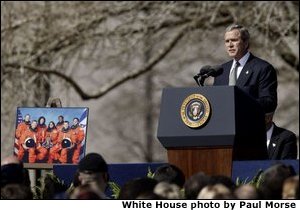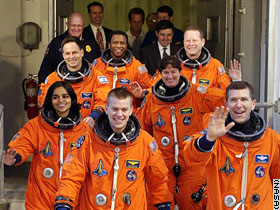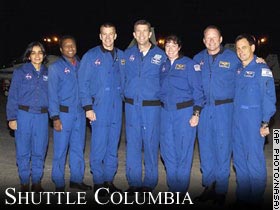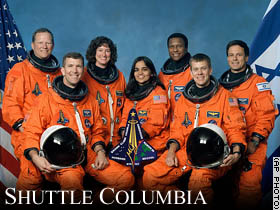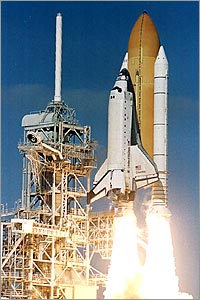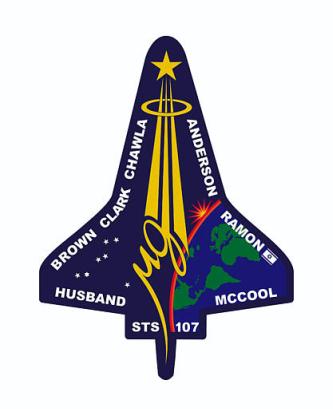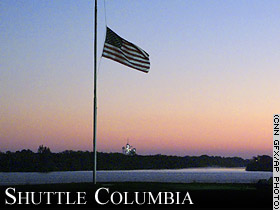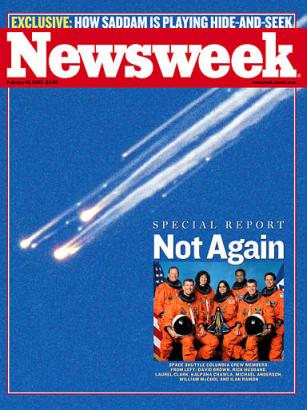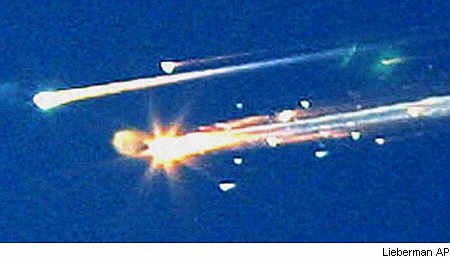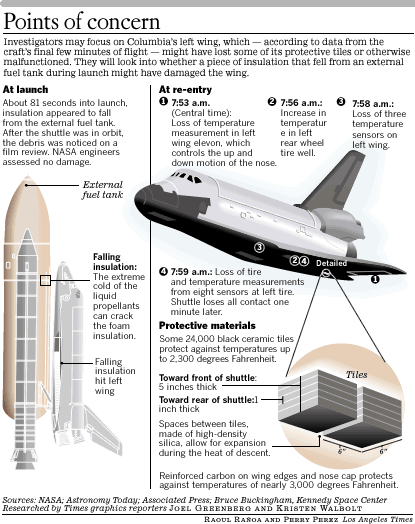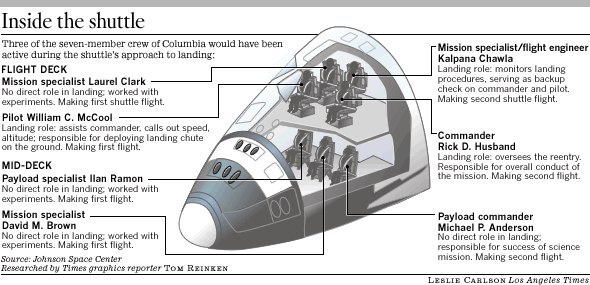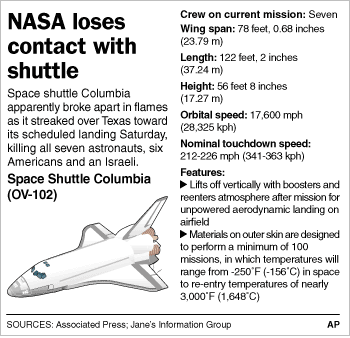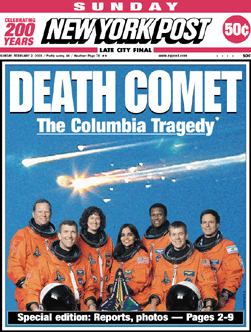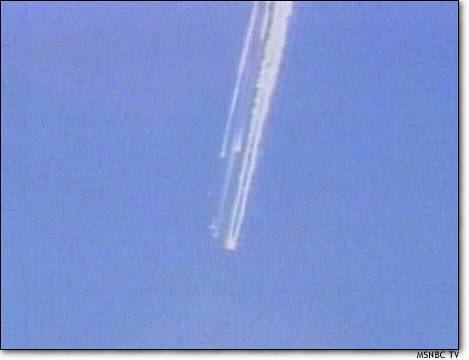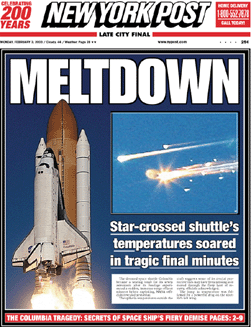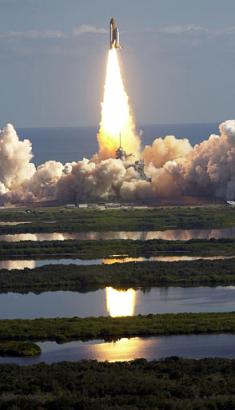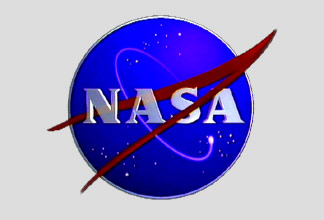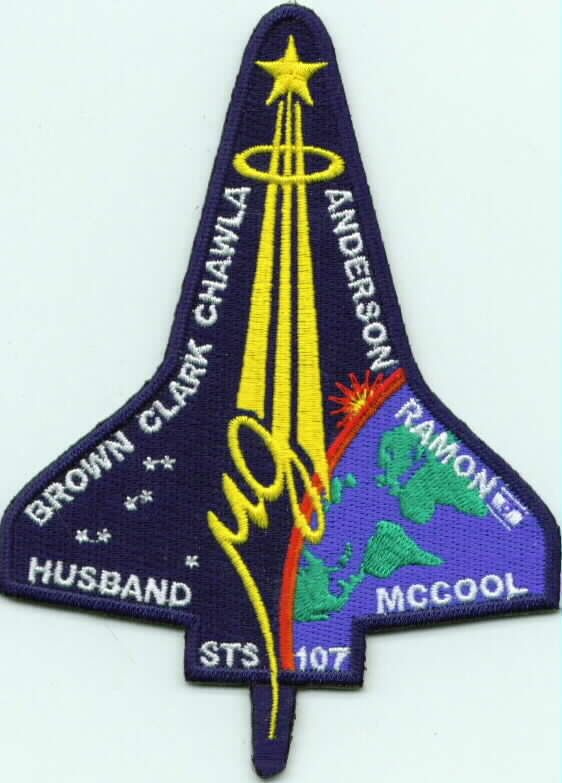Shuttle Columbia Memorial Dedicated At Arlington National Cemetery:
3 February 2004
The Best They Could
They yearned to be the best they could
Each faced the risk, they understood
Their mission left the world they knew
How proud they were, rock solid too
Their passage to the last frontier
Would be their final march, no fear
So missed these pioneers will be
Etched firmly in our memory
Their families bear what we can’t see
As do their friends, all proud to be
Let’s pray for those who bear grave pain
Dear God please help each one sustain
We must hold steady to their course
These words should be our driving force
Their want to benefit mankind
Was in their heart, so well defined
My thought now turns to God above
And those who share His peace and love
© 2003 Roger J. Robicheau
“Columbia is lost. There are no survivors.”
– President Bush
“We lost them so close to home.”
President Bush At Columbia Memorial Service
Houston, Texas, 4 February 2003
Remarks by the President at the Memorial Service in Honor of the STS-107 Crew, Space Shuttle Columbia
National Aeronautics and Space Administration
Lyndon B. Johnson Space Center
Houston, Texas
12:35 P.M. CST
THE PRESIDENT: Their mission was almost complete, and we lost them so close to home. The men and women of the Columbia had journeyed more than 6 million miles and were minutes away from arrival and reunion.
The loss was sudden and terrible, and for their families, the grief is heavy. Our nation shares in your sorrow and in your pride. And today we remember not only one moment of tragedy, but seven lives of great purpose and achievement.
To leave behind Earth and air and gravity is an ancient dream of humanity. For these seven, it was a dream fulfilled. Each of these astronauts had the daring and discipline required of their calling. Each of them knew that great endeavors are inseparable from great risks. And each of them accepted those risks willingly, even joyfully, in the cause of discovery.
Rick Husband was a boy of four when he first thought of being an astronaut. As a man, and having become an astronaut, he found it was even more important to love his family and serve his Lord. One of Rick’s favorite hymns was, “How Great Thou Art,” which offers these words of praise: “I see the stars. I hear the mighty thunder. Thy power throughout the universe displayed.”
David Brown was first drawn to the stars as a little boy with a telescope in his back yard. He admired astronauts, but, as he said, “I thought they were movie stars. I thought I was kind of a normal kid.” David grew up to be a physician, an aviator who could land on the deck of a carrier in the middle of the night, and a shuttle astronaut.
His brother asked him several weeks ago what would happen if something went wrong on their mission. David replied, “This program will go on.”
Michael Anderson always wanted to fly planes, and rose to the rank of Lt. Colonel in the Air Force. Along the way, he became a role model — especially for his two daughters and for the many children he spoke to in schools. He said to them, “Whatever you want to be in life, you’re training for it now.” He also told his minister, “If this thing doesn’t come out right, don’t worry about me, I’m just going on higher.”
Laurel Salton Clark was a physician and a flight surgeon who loved adventure, loved her work, loved her husband and her son. A friend who heard Laurel speaking to Mission Control said, “There was a smile in her voice.”
Laurel conducted some of the experiments as Columbia orbited the Earth, and described seeing new life emerge from a tiny cocoon. “Life,” she said, “continues in a lot of places, and life is a magical thing.”
None of our astronauts traveled a longer path to space than Kalpana Chawla. She left India as a student, but she would see the nation of her birth, all of it, from hundreds of miles above. When the sad news reached her home town, an administrator at her high school recalled, “She always said she wanted to reach the stars. She went there, and beyond.” Kalpana’s native country mourns her today, and so does her adopted land.
Ilan Ramon also flew above his home, the land of Israel. He said, “The quiet that envelopes space makes the beauty even more powerful. And I only hope that the quiet can one day spread to my country.” Ilan was a patriot; the devoted son of a holocaust survivor, served his country in two wars. “Ilan,” said his wife, Rona, “left us at his peak moment, in his favorite place, with people he loved.”
The Columbia’s pilot was Commander Willie McCool, whom friends knew as the most steady and dependable of men. In Lubbock today they’re thinking back to the Eagle Scout who became a distinguished Naval officer and a fearless test pilot. One friend remembers Willie this way: “He was blessed, and we were blessed to know him.”
Our whole nation was blessed to have such men and women serving in our space program. Their loss is deeply felt, especially in this place, where so many of you called them friends. The people of NASA are being tested once again. In your grief, you are responding as your friends would have wished — with focus, professionalism, and unbroken faith in the mission of this agency.
Captain Brown was correct: America’s space program will go on.
This cause of exploration and discovery is not an option we choose; it is a desire written in the human heart. We are that part of creation which seeks to understand all creation. We find the best among us, send them forth into unmapped darkness, and pray they will return. They go in peace for all mankind, and all mankind is in their debt.
Yet, some explorers do not return. And the loss settles unfairly on a few. The families here today shared in the courage of those they loved. But now they must face life and grief without them. The sorrow is lonely; but you are not alone. In time, you will find comfort and the grace to see you through. And in God’s own time, we can pray that the day of your reunion will come.
And to the children who miss your Mom or Dad so much today, you need to know, they love you, and that love will always be with you. They were proud of you. And you can be proud of them for the rest of your life.
The final days of their own lives were spent looking down upon this Earth. And now, on every continent, in every land they could see, the names of these astronauts are known and remembered. They will always have an honored place in the memory of this country. And today I offer the respect and gratitude of the people of the United States.
May God bless you all.
“My fellow Americans, this day has brought terrible news and great sadness to our country. At 9 o’clock this morning, Mission Control in Houston lost contact with our space shuttle Columbia. A short time later, debris was seen falling from the skies above Texas. The Columbia’s lost. There are no survivors.
Onboard was a crew of seven — Colonel Rick Husband, Lieutenant Colonel Michael Anderson, Commander Laurel Clark, Captain David Brown, Commander William McCool, Dr. Kalpana Chawla, and Ilan Ramon a colonel in the Israeli air force.
These men and women assumed great risk in this service to all humanity. In an age when space flight has come to seem almost routine, it is easy to overlook the dangers of travel by rocket and the difficulties of navigating the fierce outer atmosphere of the earth.
These astronauts knew the dangers, and they faced them willingly, knowing they had a high and noble purpose in life. Because of their courage and daring and idealism, we will miss them all the more.
All Americans today are thinking, as well, of the families of these men and women who have been given this sudden shock and grief. You’re not alone. Our entire nation grieves with you. And those you loved will always have the respect and gratitude of this country.
The cause in which they died will continue. Mankind is led into the darkness beyond our world by the inspiration of discovery and the longing to understand. Our journey into space will go on.
In the skies today, we saw destruction and tragedy. Yet farther than we can see, there is comfort and hope.
In the words of the prophet Isaiah, “Lift your eyes and look to the heavens. Who created all these? He who brings out the starry hosts one by one and calls them each by name. Because of his great power and mighty strength, not one of them is missing.”
The same creator who names the stars also knows the names of the seven souls we mourn today. The crew of the shuttle Columbia did not return safely to Earth, yet we can pray that all are safely home.
May God bless the grieving families, and may God continue to bless America.”
Statement To The Nation By President George W. Bush
1 February 2003
From a contemporary press report: 1 March 2003:
Families try to deal with heartache
At night, the sorrow seems to seep from the pillow.
It is then, when the commotion and distractions of the day have subsided and the house is quiet, that Joann Sykes most misses her brother, Columbia astronaut Michael Anderson.
For Jane Husband, mother of shuttle commander Rick Husband, the sadness starts the moment she awakens in the morning. The first thought in her head is Rick — Rick is gone.
The hardest time for Shawn McCool is at night when the air is clear and stars fill the sky. That’s when the grief for his brother, astronaut William McCool, is at its deepest.
Sadness overcame Laurel Salton Clark’s husband Jon Clark as he looked through the photo albums and scrapbooks his wife kept during their 12-year marriage. Clark, who works for the National Aeronautics and Space Administration as a neurologist, flight surgeon and space-accident adviser, said his fits of weeping began to alarm his 8-year-old son Iain.
“Dad, will you please stop it?” the boy told his father. “You’re bumming me out.”
A month after the space shuttle Columbia disintegrated over Texas on a clear blue Saturday morning, the families of the seven astronauts are still struggling to cope with the loss of their brothers and sisters, sons and daughters, husbands, wives, fathers and mothers.
The astronauts left behind 12 grieving children, six spouses, 13 parents and 20 brothers and sisters across three countries. Some are still wet with tears. Some have come to accept the calamity as simply something inevitable and irreversible.
“Eventually something is going to go wrong,” Joann Sykes said. “It’s only a question of when and how bad.”
But others are frustrated, perplexed and wondering whether their loved ones died unnecessarily.
“You can’t help but wonder what went wrong,” Clark’s sister Lynne Salton, 40, of Kansas City said. “Did NASA really mess up that bad? Was there some way for them to get home safely? Is there anything they could have done, but didn’t?”
Salton questions why NASA did not place remote cameras around the outside of the shuttle so the space agency could monitor any damage: “NASA has the technology to use remote cameras, but they have declined to put that technology into use.”
Of Clark’s family members, Lynne Salton may be having the most difficult time coping with Laurel’s death. Recently, she said, she was driving and suddenly burst into tears when she heard the Dire Straits song “Sultans of Swing.” The song was big when they were in high school. When friends saw the Salton sisters, they used to tease, “Here comes the Sultans of Swing.”
Work as solace
Jon Clark, 49, of Houston, has found solace by throwing himself into his work — which in the past has included working with the recovery and investigation teams after shuttle accidents. Normally, he would have been among those sent to examine the remains of the astronauts.
This time, he’s on the outside looking in on the Columbia disaster. Trying to dissect what went wrong helps him cope with his wife’s death.
He finds comfort from the recovery of a videotape taken by Laurel just minutes before the Columbia disintegrated. He watches the tape again and again, searching for clues.
“It’s my way of dealing with it, you know?” Clark said.
Iain is much the same, concentrating on his schoolwork to keep from missing his mother. The boy attacks his assignments with an energy his father says he has never seen before.
On the day of his mother’s death, as father and son were flying back home from Florida to Houston, Iain suddenly started waving out the window as they came into Texas.
“He was just moving his hand back and forth very slowly,” Clark said.
He asked his son what he was doing.
“I’m waving goodbye to Mommy,” he told his father. “I felt her.”
Amazing achievements
In India, the brother of astronaut Kalpana Chawla said his family is dealing with her death by focusing on her amazing achievements. The Columbia mission was her second into space.
“I never, ever imagined that she would reach these heights. It was far beyond my imagination,” said Sanjay Chawla, 43, of New Delhi. “Maybe it’s hard to appreciate this in the United States, but in India, it is absolutely incredible.”
Chawla, the first Indian-born woman astronaut, is a celebrity and role model, especially for young women, in her native country.
“Her message that nothing is impossible and her great love for what she was doing is something we are finding soothing in our grief,” he said.
The youngest of four children, Kalpana was nicknamed “Montu,” an affectionate name for a small child in Hindi. Her parents were extremely protective of her and agreed to her pleadings to go to the United States only on the condition that Sanjay accompany and live with her.
“She was my little sister and I loved her just like she loved me,” Sanjay Chawla said. “During this mission, she seemed absolutely at her happiest.”
At one point during the mission, she e-mailed her family that the view from the spacecraft was “worth a lifetime.”
For Joann Sykes, the death of Michael Anderson is like the loss of a twin. The two middle children of Bobbie and Barbara Anderson were born two years and two days apart. Michael and Joann were so close growing up that they shared birthday parties — blowing out the candles on Dec. 26, midway between his birthday on Dec. 25 and hers on Dec. 27.
“Even when we got to be adults and go home for Christmas, we always had our birthday on the 26th of December,” said Sykes, 45, of Oklahoma City.
God called him home
His death, she said, was his destiny. He achieved his dreams and then God called him home.
The Andersons are a family buttressed in their grief by their religious beliefs.
“I have a strong faith in the Lord. That is what has brought me through this and will continue to sustain me,” said his mother, Barbara Anderson, 67, of Spokane, Wash. “It was a shock and overwhelming, but I’ve been good. It amazes me that I haven’t had real down times.”
Michael’s widow, Sandra, is adjusting to the loss of her husband, Barbara Anderson said. His daughters, 11-year-old Sydney and 9-year-old Kaycee, are trying to accept their new life without a father.
“They’re in school, doing the normal things. I’m sure they have some times when they think of their dad and are sad, but they seem to be doing OK,” she said.
When she thinks of her son, Barbara Anderson sees the smile on his face. He was a strong, intelligent, multitalented man, but the image that remains in the minds of his family is the smile and the good humor behind it.
“He was always happy, always smiling, always had something good to say. He was a good teaser. He liked to tease me about my weight,” she said.
Image can’t be erased
But when Jane Husband closes her eyes and thinks of her son, the Columbia’s commander, the image that can’t be erased is the televised picture of the shuttle streaking across the sky like a white meteor breaking into pieces as it descended toward Earth.
“The image right now is not very good. All I can see is that shuttle breaking apart,” Jane Husband, 70, of Amarillo, Texas, said. “The first thing on my mind when I wake up is Rick. And before I go to bed. There are times you still cry. I lost a son.”
Rick’s wife, Evelyn, is a strong woman, Jane Husband said, but she’s now a single mother with a 7-year-old son and 12-year-old daughter: “She is doing her best. Just like the rest of us, it’s something that is going to have to take time.”
The children’s father helped coach their soccer teams. He and Matthew were in Indian Guides together. He went skating with his children and shot baskets with them in the back yard.
Shawn McCool, 31, said he always looked up to his older brother growing up, and continues to do so after his death. The two brothers were 10 years apart but shared the desire to fly. An Army pilot, Shawn McCool said he has tried to carry on his brother’s work: speaking to schoolchildren, answering their questions about Willie McCool’s life and death.
Staying busy helps
Staying busy keeps him from grieving the loss of his brother, his role model, his hero. It’s only at night, on those clear-sky evenings, when the sadness fills the empty spot in his heart.
He looks at the stars and thinks of the triumph and tragedy of his brother’s first flight into the heavens. The ink-black sky splattered with pinpricks of light reminds him of all his brother accomplished and all that was left undone.
He looks to the stars, Shawn McCool said, and thinks, “He’s still up there.”
After a month, much of the nation has moved on. There have been other tragedies, other losses of life, more terrorism alerts, more threats of war. The families of the astronauts remain behind, alone with their private anguish, unanswered questions and unfinished business.
Funerals scheduled
Anderson, Clark and David M. Brown have yet to be buried, their funerals scheduled for March 10 at Arlington National Cemetery near Washington, D.C. The remains of astronaut Ilan Ramon were buried in Israel on Feb. 11, the funeral postponed for one day in observance of his son’s birthday. Husband was buried in his hometown of Amarillo.
Chawla’s remains were cremated and her family plans a funeral for her in India in about a week, her niece said.
McCool’s family attended a funeral service Saturday at the U.S. Naval Academy in Annapolis, Md., after which the astronaut’s remains were to be buried back home in Washington State, his mother said.
The month has been filled with so many memorial services and other obligations that McCool’s mother feels she hadn’t had time to truly mourn the loss of her oldest child.
“I don’t think our grieving has started yet,” said Audrey McCool, 62, of Las Vegas.
Forever changed
Life goes on, but the family members feel forever altered.
Jon Clark said his wife’s death has had a profound impact on how he views life.
Before Feb. 1, he was a workaholic spending more time at work than with his family. His world, he said, now revolves around Iain.
Clark said he might retire early and become a stay-at-home dad — something he never would have considered before.
Since Laurel Clark’s death, father and son have become extremely close. Talking and reminiscing about her seems to help them both.
One recent morning, Clark awoke and started preparing for work. For a moment, his mind blocked out reality, returning to the days before his wife left for space and never returned.
“Laurel, where’s my socks!” he hollered.
The words came out before he knew what he was saying.
“It just blurted out of my mouth,” Clark said. “Iain and I both looked at each other. Then we both started laughing. It wasn’t a happy laugh.”
They laughed so they wouldn’t cry.
“It was funny,” Clark said, “and sad at the same time.”
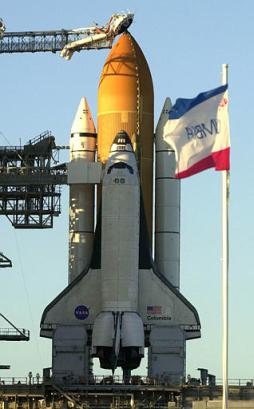
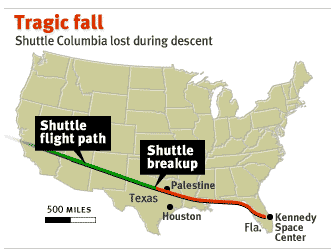
Michael Robert Patterson was born in Arlington and is the son of a former officer of the US Army. So it was no wonder that sooner or later his interests drew him to American history and especially to American military history. Many of his articles can be found on renowned portals like the New York Times, Washingtonpost or Wikipedia.
Reviewed by: Michael Howard

